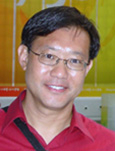
Xiaodong Zhang, is among 52 of the leading computer scientists worldwide named as Fellows by the Association of Computing Machinery (ACM). ACM cited the award was given "for his contributions to data and memory management in distributed systems." ACM, the world's largest scientific and educational computing society, bestows their Fellow awards to a small and elite group of ACM members for their outstanding accomplishments in computing and information technology and in the large computing community.
"These men and women are advancing the art and science of computing with enormous impacts for how we live and work," said Vinton Cerf, ACM President and Turning Award Winner. "The impact of their contributions highlights the role of computing in creating advances that range from commonplace applications to extraordinary breakthroughs, and from the theoretical to the practical. Some recipients have also helped to broaden participation in computing, particularly among underrepresented groups, and to expand its impact across multiple disciplines."
Xiaodong Zhang is the Robert M. Chritchfield Professor in Engineering, and Chair of the Computer Science and Engineering Department at The Ohio State University. In addition to his busy administrative and professional service duties, Zhang continues to maintain a high profile research program. While the intellectual pursuit still maintains prominence in his research, Xiadong also strives to transfer his work into advanced technology to impact general-purpose computing systems in both hardware and software. Several technical innovations and research results from his research group have been widely adopted in commercial processors, major operating systems and databases, and distributed systems.
In 2000, Dr. Zhang and his former Ph.D. students Zhao Zhang and Zhichun Zhu published a paper in the Annual Symposium on Microarchitecture, which demonstrated the source of address mapping conflicts under the conventional DRAM structure, thereby causing a significant memory access delay. Their proposed permutation-based interleaving technique effectively solves the conflict problem with a trivial hardware cost. The proposed method was directly and quickly adopted in the Sun MicroSystems' UltraSPARC IIIi processor, which has been widely used for many applications in entry level servers, in workstations, and in desktop products of Sun. This permutation technique has also been commonly used in many embedded processors including AMD, Intel, and NVIDIA.
In SIGMERIICS '02, Song Jiang, another former Ph.D.mentee, and Xiaodong published the LIRS algorithm that fundamentally addresses the limits of the LRU replacement used in almost all memory-capable digital systems, from large computer systems and databases to small devices. LIRS has been adopted in MySQL, a major database system in the society since 2007. Today the LIRS algorithm and variations/approximations on it are widely used in in numerous systems and applications. For example, an approximation of LIRS (clock-pro, a USENIX '05 paper with his former Ph.D. students Song Jiang and Feng Chen) has been adopted in NetBSD operating system. The data replacement called SplitLRU in Linux operating system is a variation of clock-pro. LIRS has also been adopted in Infinispan, a Java-based data grid system, and has been implemented in a Java class ConcurrentLinkedHashMap that is used as a software cache for many applications.
Another cache related work that has made impact is to use operating system to manage the last level hardware caches in multicore processors, that was published in HPCA 2008. The work has been quickly adopted by Intel Software and Service Group (SSG) as a software solution in various applications. One example quoted by the Intel SSG is that software cache partitioning method "has been adopted by a major industrial automation vendor and facilitated the deployment on multi-core Intel platforms".
If the cache data management of in both hardware and software is related to "small data" of high locality, Dr. Zhang has started to look into "big data" related system research. Collaborating with several Facebook engineers, Xiaodong and his group have developed a data placement structure called Record Columnar File (RCFile) that can efficiently utilize the network and storage resources for big data processing (published in ICDE '11). RCFile has been widely used in real-world systems. For example, it has become the default data placement structure in Facebook's production data warehouse, which is so far the largest Hadoop data warehouse in the world. RCFile is also adopted in two open source data analytic systems, Apache Hive and Apache Pig, which are being used in major Internet services, including Facebook, Linkedin, Taobao, Twitter, and Yahoo.
In addition, the group has developed YSmart, a correlation-aware SQL-to-MapReduce translator to automatically produce optimized MapReduce programs from complex queries. Co-authored with Research Scientist Rubao Lee, Ph.D. students Yin Huai, Tian Luo and Yuan Yuan, Facebook engineer Yongqiang He, and Emory University faculty Fusheng Wang, this work received the best paper award in ICDCS '11. After collaborative efforts of one year with Facebook engineers, YSmart has been a part of open source Hive data warehouse. An independent version of YSmart has been publically available and been used in academic and research community.
"I am pleased to learn about the ACM Fellow election. I think it is a strong recognition to my former and current students and collaborators and to my long-term efforts to emphasize on impact-driven research," Xiaodong Zhang said.
Zhang joined Ohio State as the CSE Department Chair in 2006 from the College of William and Mary, where he was Lattie P. Evans Professor and Chair of the Computer Science Department. He was named as IEEE Fellow for his contributions in computer memory systems in 2008. He received his Ph.D. in Computer Science from University of Colorado at Boulder, where he received a Distinguished Engineering Alumni Award in 2011.
ACM will formally recognize Xiaodong Zhang and all of the 2012 Fellows at its Annual Awards Banquet on June 15, 2013 in San Francisco.
For 2012 ACM Fellow Announcement, click here.